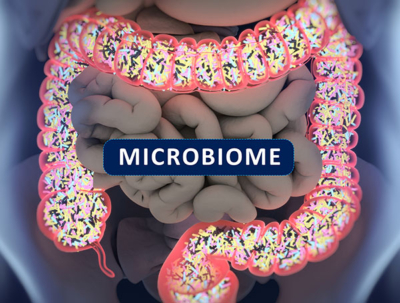Unbalanced Gut Microbiome Can Contribute to 7 Health Conditions

There are roughly 1,000 different species of bacteria living in your gut – trillions in all – and they’re staying for dinner.
What do you want to feed them?
Because if these microscopic organisms, known as the gut microbiome, don’t eat right, your overall health can suffer in a number of ways. Your gut microbiome is thought to play a role not just in digestion, but in a well-functioning immune system, heart, central nervous system, and other areas of your health.
This blog will help you understand why.
Why You Have a Gut Microbiome
The gut microbiome is a diverse environment of bacteria, viruses, fungi, and other microscopic organisms (microbes). Most live in an area of the intestines called the cecum. Together, they work as a community, breaking down the nutrients that enter your digestive system and turning them into energy. Bacteria also produce valuable substances such as vitamins and short fatty acids by degrading waste products.
Each of these species plays a different role, so the more diverse the microbiome the healthier it is considered to be.
This is why a varied diet is important – it nourishes a more complex microbiome to help intestinal cells better digest foods and prevent disease-causing bacteria from clinging to the intestines.
When Your Gut Microbiome Suffers, You Suffer: 7 Leading Conditions
Now here’s the watch-out: While most of your gut microbiome is made up of do-gooders, there are some bad bugs lurking in there. What you eat can keep these bad bacteria in check, while supporting the good microbes.
An imbalanced microbiome, also called “microbial dysbiosis”, and other changes in the microbiome have been associated with the following conditions:
-
- Clostridium Difficile (C.Diff.) infection – Clostridium Difficile is a type of bacteria that can be found in the guts of some healthy people. Sometimes, especially in patients who recently used antibiotics, strains of C.Diff. that produce harmful toxins can lead to a serious (even life-threatening) infection. Transplants of microbes found in stool of healthy donors is one of the ways Doctors use to treat this serious infection.\
- Irritable bowel syndrome (IBS) – IBS is a cluster of digestive symptoms, including abdominal pain, bloating, diarrhea, and constipation, which could be caused by a miscommunication between the brain and gut. Research indicates that patients with IBS also experience changes in their gut microbiomes.
- Inflammatory bowel disease (IBD) – When the body’s immune system attacks the bowel, it can cause chronic inflammation. Symptoms can include diarrhea, weight loss, abdominal cramping, and bloody stools. IBD has long been characterized by an imbalance in the gut microbiome, and increasing evidence suggests gut viruses may contribute to the condition.
- Heart disease – Recent studies link a lack of beneficial gut bacteria with a range of cardio issues including heart failure, high blood pressure, strokes, and heart disease. Some research shows patients with heart weakness suffer digestive issues associated with imbalances in the gut. Studies further correlate intestinal bacteria imbalances with coronary artery disease.
- Diabetes – When your body doesn’t produce enough insulin, your blood sugar becomes too high, resulting in Type 2 diabetes. People with high levels of certain gut bacteria may be more sensitive to insulin, research from Cedars-Sinai Medical Center shows, while other bacteria can lower their sensitivity.
- Brain health – The gut communicates with the brain through the nerves that connect the two. It has been suggested that some substances produced by the microbiome can travel to the brain and lead to various diseases, including Parkinson’s and Alzheimer’s. (The microbiome also stimulates immune system cells, which send signals to the brain.)
- Weight gain – Because the different species of your gut microbiome influence how foods are digested, they can play a significant role in weight management. Some species make inflammatory chemicals that may contribute to weight gain. Others produce chemicals that provide a sense of fullness, so you eat less.
Tips for a Balanced Microbiome
Of the 1,600 to 3,000 calories health experts advise we eat daily, try to make a good share of them microbiome friendly. Instead of fried foods, processed meals, and snacks with lots of processed sugar, opt for the following:
- Fiber-rich whole grains that aid digestion, including whole wheat, brown rice, and oatmeal.
- Fermented foods like sauerkraut, kombucha, and probiotic yogurt.
- Prebiotics (indigestible carbohydrates) that feed good bacteria, such as bananas, asparagus, and garlic.
Make these your go-to foods when hungry. Because remember, you’re not just eating for one. You’re eating for trillions.
To learn more about what types of foods to eat for a happy, balanced gut microbiome, see a menu of our blogs on the topic here.

